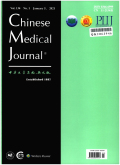首页|期刊导航|中华医学杂志(英文版)|Role of maternal-fetal immune tolerance in the establishment and maintenance of pregnancy
中华医学杂志(英文版)2024,Vol.137Issue(12):1399-1406,8.DOI:10.1097/CM9.0000000000003114
Role of maternal-fetal immune tolerance in the establishment and maintenance of pregnancy
Role of maternal-fetal immune tolerance in the establishment and maintenance of pregnancy
摘要
关键词
Maternal-fetal interface/Immune tolerance/Trophoblasts/Decidual stromal cells/Decidual immune cellsKey words
Maternal-fetal interface/Immune tolerance/Trophoblasts/Decidual stromal cells/Decidual immune cells引用本文复制引用
Jingjing Wang,Tao Han,Xiaoming Zhu..Role of maternal-fetal immune tolerance in the establishment and maintenance of pregnancy[J].中华医学杂志(英文版),2024,137(12):1399-1406,8.基金项目
This study was supported by the Key R & D Projects of Shaanxi Province(No.2021SF-005)and the Youth Independent Innovation Project of Tangdu Hospital(No.2023BTDQN020). (No.2021SF-005)

